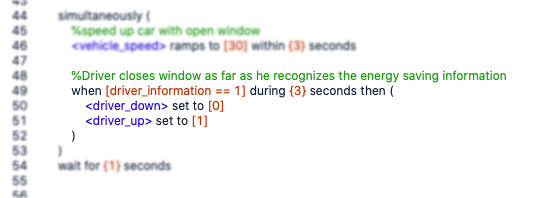Reactive Testing
Reactive Testing refers to tests which behave differently depending on satisfied conditions or occurred events. Arttest allows you to specify powerful reactive tests. Besides changes in acceptance behaviour, depending on satisfied conditions or occurred events, Arttest supports the adaption of stimuli values, too. Thus, no exact knowledge about timing is required and thus tests can be decoupled from specific implementations which might change during the development phase or between product generations. For instance, you can check whether the starting phase of a system is terminated using a condition or event, without knowledge about the exact duration of the phase, and consequently begin an accellerating phase, driving scenario, etc.

Combining reactive elements with Arttest internal signals and evaluation features extends the testing possibilities even further.
For instance, consider the part of a fault injection test below, with signal started being a signal indicating that the systems start phase completed and sensor_s1 being a sensor signal from the plant model, overridden by the test with value 0, one second after the start phase was completed.

Reactively injecting a fault to a sensor signal
Similar, acceptance criteria and tolerances could be changed as reaction to a step function in order to check that overshoot and settling time are within required boundaries.